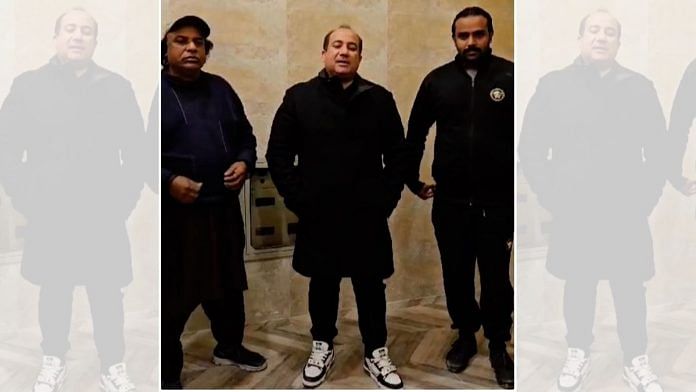Pakistani singer Rahat Fateh Ali Khan using the guru-shishya parampara to justify assaulting a student with a slipper is an example of how the mentor-mentee relationship in classical arts has been twisted into something exploitative.
Two days ago, Pakistani journalist Ghulam Abbas Shah posted a video clip, where Khan can be seen repeatedly hitting a man over a missing ‘bottle’. Khan has denied the ‘bottle’ referred to alcohol, making his shishya, whom he beat, come on camera with his father to claim that it was ‘holy water’—“Pir ji ka dum kiya hua paani”—which he had misplaced.
“The relationship between a teacher and student is such that when he does well, we give him love and when he does wrong, we punish him,” Khan said in a ‘clarification’ video posted on Instagram soon after the assault clip went viral on social media. But the damage was done.
“Many times it is the torch bearers of tradition that end up setting the worst examples for society…” Rafay Mahmood, a Karachi based journalist posted on X (Twitter), and called Khan a “vile, horrendous monster”.
Mahmood is right. Classical arts enjoy a special status in Indian and Pakistani society. The respect commanded by performers, musicians, and singers is exclusive, and society looks up to them as representatives of the best of our cultures.
In the name of ‘parampara’
Gurus have unbridled power over their students, who are taught to revere their teachers like gods. This has to change.
This kind of power also gives gurus a seemingly free ticket to abuse their students. Such deplorable incidents are generally justified by a simple line: ‘Everything gurus do, they do for the betterment of the student.’
In the almost four-minute long clarification, Khan says that the contents of the viral video pertain to “an ustaad (teacher) and his shagird (student)”—meaning, it’s fine for him to do to them whatever he wishes as long as he is their teacher. On the face of it, Khan apparently can do whatever he wants. Not only did he brutally thrash the man, who so far remains nameless, he also made him appear on camera—first with him and then all by himself—to reprimand those sharing the clip while calling the person who recorded the video a ‘blackmailer’. In both videos, the student’s father is also present, nodding at everything his son is saying.
If this entire charade wasn’t enough, Rahat Fateh Ali Khan also brings his driver before the camera to answer if he has ever yelled at him. “Ask my driver…ask him!” The driver, once again nameless, dutifully says that Khan is like family to him.
Abuse by gurus an ‘open secret’
In India, women in the classical arts have slowly started questioning this power structure that mostly goes unchecked. ThePrint reported on how dancers are harassed—sometimes sexually—in a traditional guru-shishya parampara.
This unhindered power over students was also cited as one of the the reason behind the alleged abuse by classical musicians Gundecha brothers in Bhopal and by Kathak dancer Birju Maharaj.
Female dancers repeatedly say abuse by gurus is an ‘open secret’ in the dance community and they are forced to stay silent for fear of losing their careers. Abuse is not a perk that comes with the job. Life is not an episode of succession.
In the #MeToo movement, Indian classical students had spoken against abuse. In December 2020, a student at Delhi’s Kathak Kendra lodged a police complaint against her teacher, a Pakhawaj player.
There’s nothing wrong in students respecting and revering their teacher. The guru-shishya relationship can remain ‘pure’, but on the terms of a rule-based society where any form of abuse is unacceptable. The ‘guru’ defence doesn’t cut it anymore.
A guru reserves the right to reprimand. What they don’t have is the right to abuse. The classical arts community needs to bring structural changes to reform itself. And that begins by holding to account ‘gurus’ like Rahet Fateh Ali Khan.
(Edited by Prashant)



